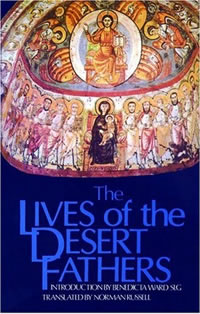Book Notes
 The Lives of the Desert Fathers (Historia Monachorum in Aegypto), translated by Norman Russell, introduction by Benedicta Ward (Kalamazoo: Cistercian Publications, 1981), 181pp.
The Lives of the Desert Fathers (Historia Monachorum in Aegypto), translated by Norman Russell, introduction by Benedicta Ward (Kalamazoo: Cistercian Publications, 1981), 181pp.
At the end of the fourth century, seven monks from Jerusalem trekked to Egypt to document the lives and teachings of the monks who had fled the corruptions of the world for the "vast trackless" desert in order to do battle with the interior geography of the human heart. Their trip produced this anonymous text, written in Greek and then later translated into Latin and amended by Rufinus. If you read this travelogue in conjunction with its companion volume, The Sayings of the Desert Fathers, both of which are eminently readable, you will enjoy an eyewitness account of these wise and witty pilgrims. A lengthy introduction by Sister Benedicta Ward (pp. 3–46) gives an excellent overview of the early monks's lives, context, and ideals. The text of about 50 pages then follows in twenty-six chapters, roughly one for each desert dweller.
In his prologue the author describes the monks as defenders of all humanity: "The people depend on the prayers of these monks as if on God Himself. . . it is clear to all who dwell there that through them the world is kept in being, and that through them too human life is preserved and honored by God." The monks, though, saw themselves much differently. With brutal candor and deep compassion they saw themselves as poor sinners who wanted to strip away the many layers of the false self in order that the true self created in God's image could offer worship to God and love to humanity — "as much as that is humanly possible." The task never ended. "It is hard, truly hard," John Climacus would write two centuries later. We should "expect trials until our last breath," advises one famous "saying," and yet we should also never despair of God's mercy.
Some of the monks lived in caves as hermits, some lived in communities behind walls, and some crafted a style of life in between the two. Some even wandered continually in permanent "exile." These monks came from all walks of life, and one of their greatest pieces of wisdom is the acknowledgment that every person is different due to temperament, personal history, strengths and weaknesses, the call of God, and so on. These pages introduce us to former criminals, scholars, tomb robbers, blacksmiths, and illiterate peasants. "Their number is past counting," says the author. Ammon was father to 3,000 monks. Sarapion guided 10,000 brothers in a hermitage. In the end, what we're called to imitate is not the austere particulars of their exterior asceticism, but their interior pursuit of the worship of God and love of humanity. Over the last twenty years I have come to love these desert mothers and fathers as reliable guides to the journey with Jesus.


